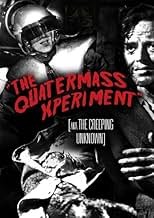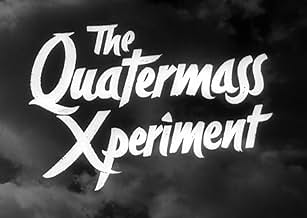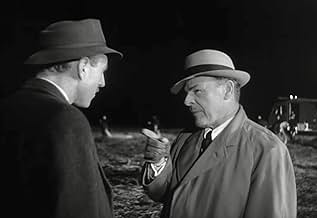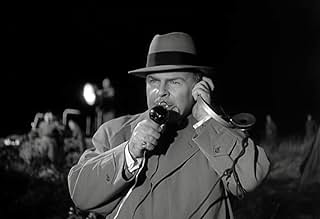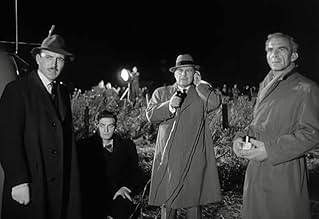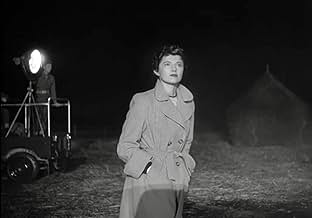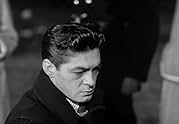IMDb RATING
6.6/10
7.9K
YOUR RATING
Professor Bernard Quatermass' manned rocket ship returns to Earth, but two of the astronauts are missing and the survivor seems ill and unable to communicate.Professor Bernard Quatermass' manned rocket ship returns to Earth, but two of the astronauts are missing and the survivor seems ill and unable to communicate.Professor Bernard Quatermass' manned rocket ship returns to Earth, but two of the astronauts are missing and the survivor seems ill and unable to communicate.
- Director
- Writers
- Stars
Jane Aird
- Mrs. Lomax
- (uncredited)
Margaret Anderson
- Maggie
- (uncredited)
Jane Asher
- Little Girl
- (uncredited)
Harry Brunning
- Night Porter
- (uncredited)
Ken Buckle
- Police Driver
- (uncredited)
Eric Corrie
- Maggie's Boyfriend
- (uncredited)
Edward Dane
- Station Policeman
- (uncredited)
Gron Davies
- Charles Green
- (uncredited)
- Director
- Writers
- All cast & crew
- Production, box office & more at IMDbPro
Featured reviews
Well written and terminally fascinating British sci-fi thriller from director Val Guest and writer Nigel Neale. It is a film of big ideas and planet-sized concepts that stares up into the unknown with a combination of wonderment and dread.
Originally a highly popular TV series, it spawned two excellent sequels and decades of creative Hollywood pilfering.
Brian Donlevy is wonderful as Quatermass, a scientist with the bullying manner of a military drill Sargent and a fierce, pragmatic streak. After a rocket that he sent into space crashes back to Earth, Quatermass and unofficial partner-in-crime Inspector Lomax (Jack Warner) uncover a bizarre alien conspiracy in which a surviving astronauts's body has been "borrowed" by extraterrestrials keen on relocating.
Director Guest gives the drama a no-nonsense, almost documentary feel. The special effects are perfectly acceptable for the period and the brooding sense of mid-century paranoia is well conveyed.
The hero is the script, though. The dialogue is fresh and colourful and writers Guest and Neale always keep the scientific jargon interesting. All the characters are believable and the performances are top notch.
Despite the fact that James Bernard's solid score is a little overbearing at times, this is a dashingly good science fiction film with a strong stench of horror.
Originally a highly popular TV series, it spawned two excellent sequels and decades of creative Hollywood pilfering.
Brian Donlevy is wonderful as Quatermass, a scientist with the bullying manner of a military drill Sargent and a fierce, pragmatic streak. After a rocket that he sent into space crashes back to Earth, Quatermass and unofficial partner-in-crime Inspector Lomax (Jack Warner) uncover a bizarre alien conspiracy in which a surviving astronauts's body has been "borrowed" by extraterrestrials keen on relocating.
Director Guest gives the drama a no-nonsense, almost documentary feel. The special effects are perfectly acceptable for the period and the brooding sense of mid-century paranoia is well conveyed.
The hero is the script, though. The dialogue is fresh and colourful and writers Guest and Neale always keep the scientific jargon interesting. All the characters are believable and the performances are top notch.
Despite the fact that James Bernard's solid score is a little overbearing at times, this is a dashingly good science fiction film with a strong stench of horror.
Unfortunately Nigel Kneal had absolutely no input into the film version of THE QUATERMASS EXPERIMENT . Out goes the philosophy and long discussions of the human condition and in comes the more formuliac and streamlined plotting of a hostile alien endangering the human race , but to be fair to Richard Landau he also jettisoned many underdeveloped subplots from the serial ( When episode one of TQE was broadcast on television Kneale was still writing episode 5 so some subplots were abandoned by Kneale in order to meet the deadline ) and - unlike film viewers in 2002 - the oft used premise of an alien entity coming back to Earth from a spaceship would still be very new to cinema audiences in the mid 50s. I might even be right in saying this is the first time this idea had appeared in cinema .
Director Val Guest treats THE QUATERMASS EXPERIMENT as SF film noir and brings in a heavy dose of mood and atmosphere especially during the night time zoo sequence. Unlike QUATERMASS 2 there`s no feeling that the night scenes were achieved by sticking a dark filter over the camera . Guest is less successful with his cast . Donlevy is relatively good at playing double crossing mobsters in the likes of THE BIG COMBO but he`s utterly unconvincing as a rocket scientist and it doesn`t help that he keeps pronouncing his name as " Qittermiss ", Margia Dean is utterly appalling as Judith Carroon , but Richard Wordsworth is outstanding as Victor Carroon even if he doesn`t have a single line of dialogue.
The BBC serial of THE QUATERMASS EXPERIMENT shocked the viewers of Britain when it was broadcast and in its own way the film version is almost as groundbreaking , it was a big hit at the UK box office which led to Hammer Films to concentrate solely on horror films something they would excell at for the next 10-15 years .
Trivia point 1 - The montage scenes of soldiers searching for Carroon at night time are actually culled from another British SF flick - SEVEN DAYS TO NOON
Trivia point 2- The last four episodes of the BBC serial were shown live on television but because of an industrial dispute they weren`t - unlike the first two episodes - recorded onto film which means no one will ever see the complete BBC QUATERMASS EXPERIMENT
Director Val Guest treats THE QUATERMASS EXPERIMENT as SF film noir and brings in a heavy dose of mood and atmosphere especially during the night time zoo sequence. Unlike QUATERMASS 2 there`s no feeling that the night scenes were achieved by sticking a dark filter over the camera . Guest is less successful with his cast . Donlevy is relatively good at playing double crossing mobsters in the likes of THE BIG COMBO but he`s utterly unconvincing as a rocket scientist and it doesn`t help that he keeps pronouncing his name as " Qittermiss ", Margia Dean is utterly appalling as Judith Carroon , but Richard Wordsworth is outstanding as Victor Carroon even if he doesn`t have a single line of dialogue.
The BBC serial of THE QUATERMASS EXPERIMENT shocked the viewers of Britain when it was broadcast and in its own way the film version is almost as groundbreaking , it was a big hit at the UK box office which led to Hammer Films to concentrate solely on horror films something they would excell at for the next 10-15 years .
Trivia point 1 - The montage scenes of soldiers searching for Carroon at night time are actually culled from another British SF flick - SEVEN DAYS TO NOON
Trivia point 2- The last four episodes of the BBC serial were shown live on television but because of an industrial dispute they weren`t - unlike the first two episodes - recorded onto film which means no one will ever see the complete BBC QUATERMASS EXPERIMENT
Before a little British company called Hammer became famous for Dracula and Frankenstein, there were the adventures of Professor Bernard Quatermass. Based on the live BBC serial from 1953, The Quatermass Xperiment put Hammer on the film world map. How that happened it obvious from this tense, realistic, and gritty science fiction classic.
The film is immensely helped by an excellent cast. Brian Donlevy's Quatermass is the archetype science fiction film scientist: a scientist obsessed with their quest for science before turning having to deal with the consequences of that quest. Donlevy plays Quatermass to perfection as a scientist who is both horrified and fascinated by the events he has set in motion. It's a strong performance filled with realism. fascination and horror. The cast also includes terrific performances from Jack Warner as Scotland Yard's Inspector Lomax, Margia Dean who takes the potentially clichéd Judith Carroon and puts flesh and blood on the character, and David King-Wood as Quatermass's fellow scientist Doctor Briscoe. The best performance of the film may well be from the character who never speaks: Richard Wordsworth as Victor Carroon. Wordsworth perfectly plays both the horror of the lone surviving astronaut and also sympathy as the worst off victim of the Quatermass experiment. This is especially true in a scene where Caroon finds himself at a dock where a little girl approaches him with her doll. It reminds one of the scene from the Universal Frankensein where the seemingly innocent takes on a darker meaning. Overall, the film has a terrific cast of actors bringing it to life.
At a time when science fiction films were defined by the clichéd and outrageous monster and alien invasion films, this film (and its TV counterpart) went in the exact opposite direction. Director Val Guest choose to do the film not in the style of the time but in a near documentary style. That's why the film work's fifty years later: it seems real in that it is a product of its time are place. If Britian had started the space race in the mid-1950's, one feels this is how it would have been.
The film is also helped by two very strong elements: the black and white cinematography and the music score. Doing the film in black and white adds atmosphere to a film that is part alien invasion and part manhunt. It helps especially in the film's fiery finale. The music score by James Bernard is terrific in adding to the atmosphere of the film and it never intrudes, but just helps to bring one a little bit closer to the edge of one's seat. The film wouldn't be the same without either one of these two elements.
Yet as much as I would like to call this film perfect, it isn't. There is one thing that the film hits and misses on: special effects. The downside of the film being so much a product of its time is that when the special effects are looked back at from a distance, they look primitive. That's not to say that the special effects are bad. The prosthetics work in particular looks good even by today's standards as far as I'm concerned. The finale of the film is the most obvious spot where the special effects are a bit of a let down by modern standards. Then again, it is hard to compare special effects from one era to another so this is an issue for the viewer to decide on.
While the special effects may hamper the film for some, one must admit that The Quatermass Xperiment is a classic of the genre. From the terrific performance (espeically of Donlevy and Wordsworth), to the realistic style and tone, to the excellent cinematography, to the dark score by Jame Bernard, The Quatermass Xperiment is a tour de force for the more intelligent and less action based science fiction films. If you can put aside the mid-1950's special effects, you're going to find a tense, realistic, and gritty science fiction classic.
The film is immensely helped by an excellent cast. Brian Donlevy's Quatermass is the archetype science fiction film scientist: a scientist obsessed with their quest for science before turning having to deal with the consequences of that quest. Donlevy plays Quatermass to perfection as a scientist who is both horrified and fascinated by the events he has set in motion. It's a strong performance filled with realism. fascination and horror. The cast also includes terrific performances from Jack Warner as Scotland Yard's Inspector Lomax, Margia Dean who takes the potentially clichéd Judith Carroon and puts flesh and blood on the character, and David King-Wood as Quatermass's fellow scientist Doctor Briscoe. The best performance of the film may well be from the character who never speaks: Richard Wordsworth as Victor Carroon. Wordsworth perfectly plays both the horror of the lone surviving astronaut and also sympathy as the worst off victim of the Quatermass experiment. This is especially true in a scene where Caroon finds himself at a dock where a little girl approaches him with her doll. It reminds one of the scene from the Universal Frankensein where the seemingly innocent takes on a darker meaning. Overall, the film has a terrific cast of actors bringing it to life.
At a time when science fiction films were defined by the clichéd and outrageous monster and alien invasion films, this film (and its TV counterpart) went in the exact opposite direction. Director Val Guest choose to do the film not in the style of the time but in a near documentary style. That's why the film work's fifty years later: it seems real in that it is a product of its time are place. If Britian had started the space race in the mid-1950's, one feels this is how it would have been.
The film is also helped by two very strong elements: the black and white cinematography and the music score. Doing the film in black and white adds atmosphere to a film that is part alien invasion and part manhunt. It helps especially in the film's fiery finale. The music score by James Bernard is terrific in adding to the atmosphere of the film and it never intrudes, but just helps to bring one a little bit closer to the edge of one's seat. The film wouldn't be the same without either one of these two elements.
Yet as much as I would like to call this film perfect, it isn't. There is one thing that the film hits and misses on: special effects. The downside of the film being so much a product of its time is that when the special effects are looked back at from a distance, they look primitive. That's not to say that the special effects are bad. The prosthetics work in particular looks good even by today's standards as far as I'm concerned. The finale of the film is the most obvious spot where the special effects are a bit of a let down by modern standards. Then again, it is hard to compare special effects from one era to another so this is an issue for the viewer to decide on.
While the special effects may hamper the film for some, one must admit that The Quatermass Xperiment is a classic of the genre. From the terrific performance (espeically of Donlevy and Wordsworth), to the realistic style and tone, to the excellent cinematography, to the dark score by Jame Bernard, The Quatermass Xperiment is a tour de force for the more intelligent and less action based science fiction films. If you can put aside the mid-1950's special effects, you're going to find a tense, realistic, and gritty science fiction classic.
In the countryside of London, a rocket crashes on a farm and Professor Bernard Quatermass (Brian Donlevy) and Scotland Yard Inspector Lomax (Jack Warner) arrive in the spot. The rocket was launched by Prof. Quatermass with the astronauts Victor Carroon (Richard Wordsworth), Greene and Reichebheim; however only Carroon is found very sick in the cabin. He is transported to a private clinic to stay under observation despite the protests of his wife Mrs. Judith Carroon (Margia Dean). She bribes a nurse to bring Carroon to her and she finds that he is transforming into a monster. Carroon escapes killing people and animals during his metamorphosis while the Scotland Yard is hunting him down and Dr. Quatermass discovers that his process is an alien invasion.
"The Quatermass Xperiment" is an early sci-fi from Hammer with a creepy alien invasion. Despite the low-budget, the screenplay is very well written and the film entertains, specially fans of sci-fi from the 50's. My vote is six.
Title (Brazil): "Terror que Mata" ("Terror that Kills")
Note: On 12 Dec 2019, I saw this film again.
"The Quatermass Xperiment" is an early sci-fi from Hammer with a creepy alien invasion. Despite the low-budget, the screenplay is very well written and the film entertains, specially fans of sci-fi from the 50's. My vote is six.
Title (Brazil): "Terror que Mata" ("Terror that Kills")
Note: On 12 Dec 2019, I saw this film again.
A British spaceship returns to Earth but instead of celebrating this first space shot, there is a lot of confusion, as two of the three crew members are missing. Additionally, the one who DID return just doesn't look or act right and he's kept under supervision and monitored as his body seems to be undergoing some sort of metamorphosis.
This isn't exactly your standard 1950s sci-fi/monster film, as the story itself is more tightly written and seems more credible than the typical "bug-eyed monster" film. Instead of the over the top acting and silly special effects, this is a more cerebral style film and the "monster" doesn't even make an appearance until near the very end. Instead, the story slowly unfolds and at the same time, simple makeup does the trick--no ping pong ball eyes, giant killer lobsters or any of the sort of tripe seen in the sillier examples of the genre. About the only negative was the whole subplot of the wife trying to kidnap her husband away from the hospital--this didn't make a lot of sense. Still, overall it's a dandy sci-fi film and worth a look.
This isn't exactly your standard 1950s sci-fi/monster film, as the story itself is more tightly written and seems more credible than the typical "bug-eyed monster" film. Instead of the over the top acting and silly special effects, this is a more cerebral style film and the "monster" doesn't even make an appearance until near the very end. Instead, the story slowly unfolds and at the same time, simple makeup does the trick--no ping pong ball eyes, giant killer lobsters or any of the sort of tripe seen in the sillier examples of the genre. About the only negative was the whole subplot of the wife trying to kidnap her husband away from the hospital--this didn't make a lot of sense. Still, overall it's a dandy sci-fi film and worth a look.
Did you know
- TriviaThe film achieved notoriety Stateside when in 1956 the parents of Stewart Cohen attempted to sue Chicago's Lake Theater and distributors United Artists for negligence after their nine-year-old son died of a ruptured artery at a double-bill of this and The Black Sleep (1956) on Sunday 28th October, during the opening sequence of the Hammer movie. Cohen entered the Guinness Book of Records as the only known case of someone literally dying of fright at a horror film (he had been unknowingly living with an undiagnosed heart condition): pathologist Dr Albert Baugher officially found that "The boy died of a heart collapse after extraordinary tension while watching a film."
- GoofsVolkswagen Bus en route to the crash site is not the same Volkswagen Bus that arrives through the gate at the crash site. VW badge is larger, chrome trim is missing and license plate is different.
- Quotes
Prof. Bernard Quatermass: There's no room for personal feelings in science, Judith!
- Alternate versionsThe original 1955 "Quatermass Xperiment" print has the closing caption "The End"; the reissued version (with a still bearing the new title "The Quatermass Experiment" inserted into the opening credits) replaces this with "A Hammer Production Produced at Bray Studios".
- ConnectionsFeatured in Frances Farmer Presents: The Creeping Unknown (1959)
- How long is The Quatermass Xperiment?Powered by Alexa
Details
- Release date
- Country of origin
- Language
- Also known as
- Pánico mortal
- Filming locations
- East India Docks, London, Greater London, England, UK(derelict boat scene with little girl)
- Production company
- See more company credits at IMDbPro
Box office
- Budget
- £45,000 (estimated)
- Runtime1 hour 18 minutes
- Color
- Sound mix
- Aspect ratio
- 1.37 : 1(original/negative aspect ratio, alternative theatrical ratio)
Contribute to this page
Suggest an edit or add missing content

Top Gap
By what name was The Quatermass Xperiment (1955) officially released in India in English?
Answer

